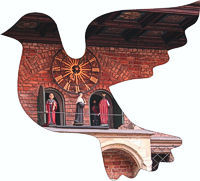|

Over 100,000 private businesses and nearly 2,000 public
firms carry on in Krakow with aggregate revenue to the tune
of about 14.6 billion euro. Usually the city's
big companies with hundreds and thousands on the payroll
come under the spotlight yet they are hardly representative
of Krakow economy. The
self-employed and small enterprises employing less than ten
workers account for over ninety percent of business entities
incorporated in the city.
Foreigners own at least partly more than 1,900 of Krakow's
companies.
Visitors from member-states of the European Union and
NATO do not need visas to enter Poland. Otherwise, when
a country wants Polish citizens to acquire a visa the
general rule is that Poland requires citizens of that
country to secure one for admission to Poland as well.
Yet all aliens save those from other EU countries need a
visa to stay in Poland beyond 90 days. [See also tips on
employment, transport, communication, currency, paying,
weights & measures, business hours, holidays, dates and
numbers, and local customs].
More tips for business visitors
As a rule expatriates and natives pay the same taxes in
Poland. Of course, there are exceptions and they benefit
the former. E.g. the country has tax treaties with
60-plus nations, including the USA, which ensure
no income is taxed twice and lower taxes apply. Value
added tax (VAT) is included in the price of almost every
product and service you purchase. Excise duty is a ‘sin
tax’ of sorts, included alongside VAT in the price of
such products as cigarettes, liquors, motor fuels, etc.
Companies incorporated or headquartered in Poland are
subject to
corporate income tax.
Personal income tax is paid both by Poland’s citizens
and by permanent residents.
More on taxes in Poland
 Get the Krakow up-to-date guide e-book
Get the Krakow up-to-date guide e-book
In Poland foreigners can freely buy apartments or plots
up to 0.4 hectare (i.e. about an acre) in urban areas.
They may also inherit any estate. Otherwise
acquisitions of urban property by aliens other
than EU citizens require authorization from the Ministry
of Internal Affairs, easily obtainable in most cases. It
applies to individuals as well as companies whenever
foreigners hold the controlling interest.
More on Krakow's real estates
See the
list of Krakow's lawyers and law firms. Sooner
or later everybody will need one of them.
All companies incorporated in Poland are equal before the law of
the country. And Polish corporations can be owned altogether and run by foreign
shareholders, while full repatriation of capital as well as after-tax profits
and dividend earnings is guaranteed. At the same time Poland's competition law,
the protection of intellectual property, bankruptcy law, etc. are nowadays up to
the Western standards.
More
on investing in Krakow
Poland’s labor costs stay at a third of Germany’s, and the country boasts a
sizeable and fast-expanding internal market, enjoys a healthy GDP growth, and
remains a model of political and economic stability in the region. And since
2004 it has been the
European Union. No wonder foreign investors flock: from multinationals to fairly
small enterprises. If you want to jump the bandwagon, Krakow appears a
particularly good place with some 8.5 million people living within a radius of
100 km. And the city is situated at Europe’s crucial crossroads between Germany
and Ukraine and between Scandinavia and the south of the continent.
More on FDI in Krakow
Krakow has always been Poland’s gourmet Mecca. And the recent decade brought
about a genuine restaurant explosion all over the city owing to the hectic
efforts of aspiring restaurateurs–native ones as well as immigrants. The Old
Town historic district seems virtually stuffed with establishments catering to
all kinds of diners.
Krakow’s restaurants, a dining guide
There is no subway in Krakow, nonetheless that nearly million city has a fairly
dense public transport system which consists of streetcars and buses a municipal
company operates and a number of private-owned minibus fleets.
Taxicabs are plentiful and relatively cheap in Krakow – within the city
boundaries the fare should not exceed 20 euro. And you can dial roughly a dozen
different taxi telephone centers, each with its own fleet.
More on Krakow transport
There are 25,000-plus beds to choose from in Krakow
Lodging guide to Krakow hotels
Nearly ten
million visitors show up in Krakow every year, though
only a third or so stay overnight in the city. Many
arrive and/or leave by air, but most take advantage of
the fact that Krakow lies at a major European road and
rail junction.
More on travel to Krakow
From designer garb to jewelry, and from antiques to books and works of art–Krakow’s
central
Old Town historic district,
turned into a pedestrian precinct, teems with stores of all sorts, crammed into
every available space.
More on
shopping in Krakow
|



